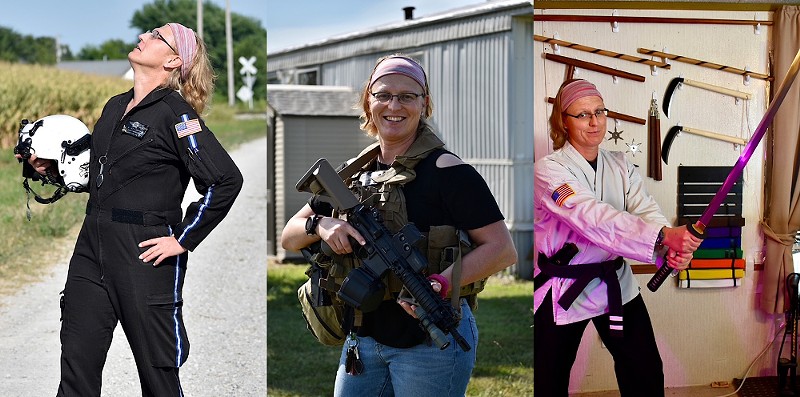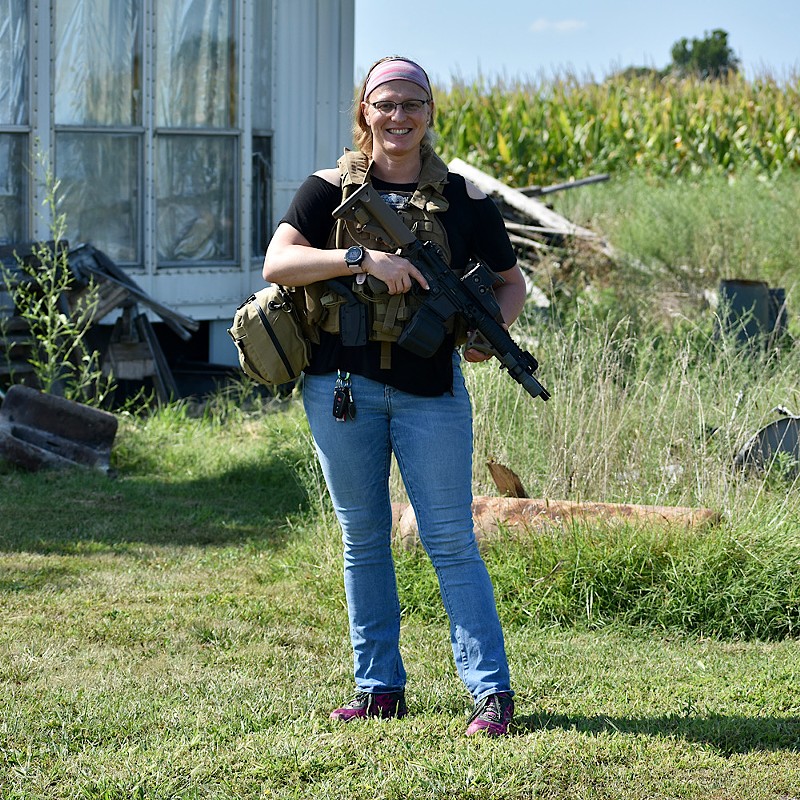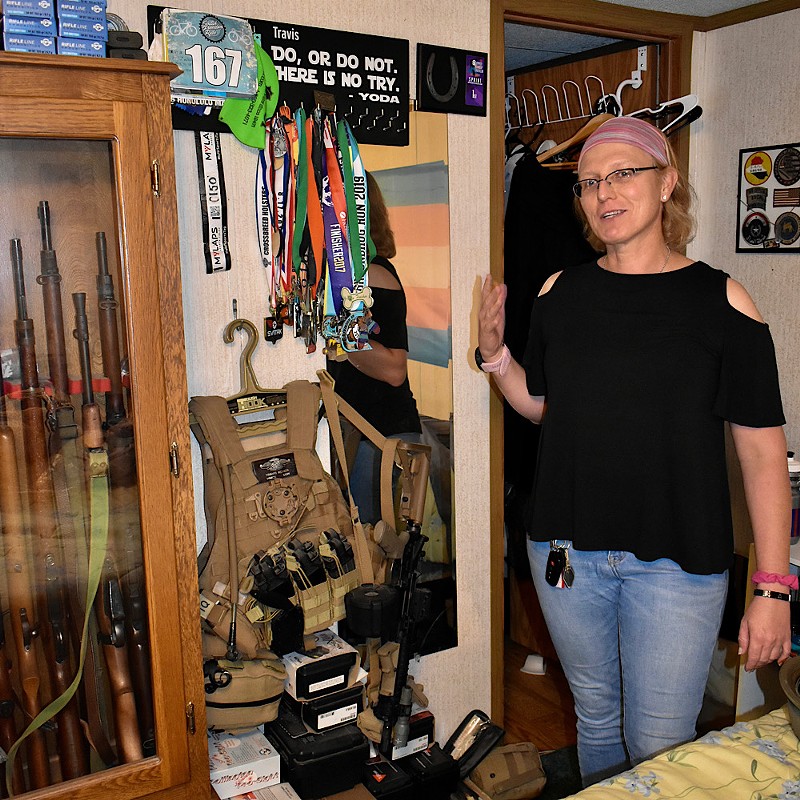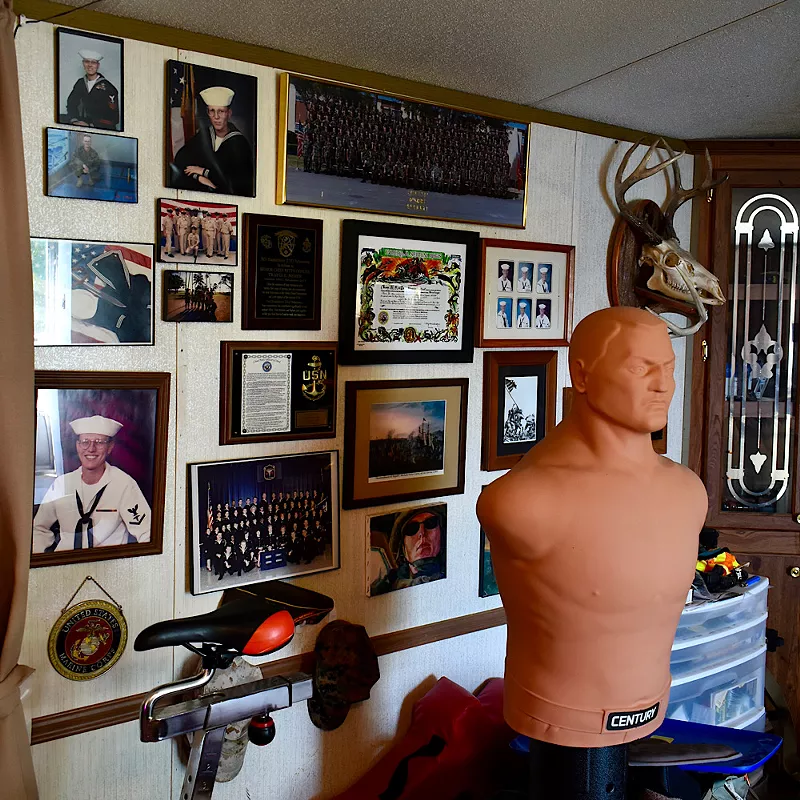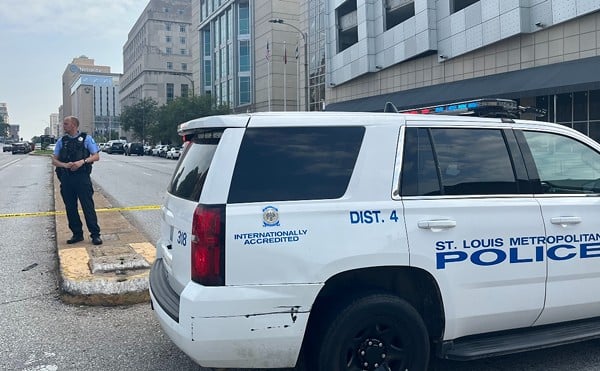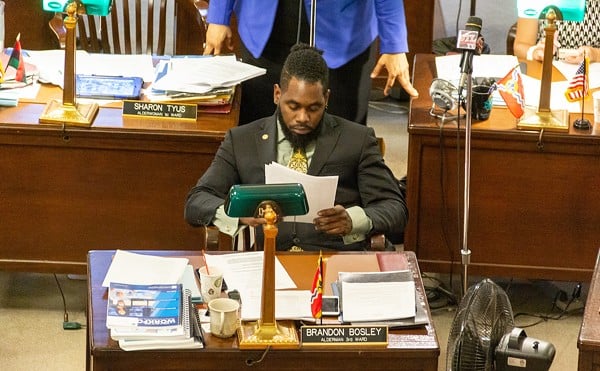Halfway through August of 2021, I took a road trip to the small farming community of Jasper, MO to visit an old military friend. Winding through desolate roads bordered by thick kudzu, drenched in the late summer air, and engulfed by the afternoon light - you could feel the transitional period of summer bleeding into fall within this southwestern corner of Missouri.
The drive was an ideal setting for reflection, and there was a great deal to reflect about: I had recently completed fourteen months of COVID shifts as a dialysis technician, cultural tensions within our country had only become more violent, and the tragic end to a twenty year American war had begun halfway across the world in Afghanistan. A collective feeling of uncertainty was palpable nationwide, so it only seemed appropriate to visit a mentor who consistently offered me invaluable guidance when I served under their leadership.
This mentor was my former Senior Chief, whose title was Senior Chief Travis Neher during the time I served with them. Senior Chief Neher is a two time combat veteran, flight paramedic, second degree black belt in karate, triathlete, gun store owner, award winning sharpshooter, and first place winner in the Cutest Baby Contest at the ‘75 Jasper County Fair. But that is just scratching the surface.
For those unfamiliar with the military, a Senior Chief is the second highest enlisted rank you can achieve in the Navy. Senior Chief Neher was my leader, and together we were Navy Hospital Corpsman - essentially medical personnel. The United States Marine Corps depends on the Navy for medical support, therefore Senior Chief Neher and myself were attached as medics to the 3rd Battalion, 23rd Marines Reserve unit based in St. Louis.
During the time we served together, officers and enlisted members alike would worship the ground Senior Chief Neher walked on. It was common to overhear whispers in the hallways detailing Senior Chief Neher’s life saving actions during their combat tours in Iraq. Senior Chief Neher was well known for enthusiastically sharing their wealth of military and medical knowledge, whether you wanted to hear it or not. It was a running joke that we would drop any and all evening plans once we gathered to discuss our orders, because Senior Chief Neher always made sure even the most mundane details were discussed meticulously.
Senior Chief Neher retired from the Navy after 25 years of dedicated service. Their journey was riddled with countless obstacles, some, a matter of life or death. However, Senior Chief Neher’s most recent accomplishment was their most challenging of all, and once again, a matter of life or death — coming out publicly as transgender.
I learned about my former Senior Chief’s transition in a very twentieth century fashion. After I completed my military obligation, Senior Chief Neher retired shortly thereafter. Years went by, and one day a “suggested follow” popped up on my Instagram feed displaying the account of Tricia Neher. When I realized that Tricia Neher was my former Senior Chief, it came as a massive surprise. This discovery also immediately challenged many of my own stereotypes regarding masculinity and femininity. What does it take to be a man? A woman? Does it really matter?
The Senior Chief I served under was Travis Neher: a “Man's Man,” a triathlete winning war hero who owned a gun store in Southwestern Missouri. Someone you only pictured in camo or carhartt, yet here were photos of her donned in a mini-skirt and a pink headband. Also, she was undeniably happy in these Instagram posts.
I sent my former Senior Chief a direct message offering support, and later that week we spoke over the phone. When Tricia answered my phone call I immediately blurted out “Senior Chief! Wow, how are you?”, to which she replied “It’s been three years since I retired, Hemmer. You can stop calling me Senior Chief now. My name is Tricia.” I happily concurred.
We spoke for hours about the struggles and heartbreak she endured all of her life. Tricia elaborated on the societal expectations that came with growing up in Jasper, MO and how these standards dictated what should be “masculine” or “feminine." Tricia always knew she was a woman, but she felt forced to suppress her femininity due to the stubborn beliefs already instilled within her environment. This suppression only grew stronger as time went on, and reached a breaking point once she retired from the military. I offered to pay her a visit with the intention of sharing her story, and in a couple of weeks I arrived at her family farm.
I was greeted by Tricia after I accidentally parked in her parents’ driveway.
“What are you doing, Hemmer?” Tricia jokingly said, as I immediately felt like I was right back in my former military days.
“Sorry, I still can't get anything right!” I replied.
Although it had been three years with various major life changes between us both, an instant feeling of comfort came with seeing Tricia again.
Tricia led me into her home, which was reminiscent of temporary barracks you would see in a Forward Operating Base overseas. Being a flight paramedic who answers emergency calls across multiple states, Trica was hardly ever home. As a result, her living quarters acted as a staging area more than a homestead, indicative of the lifestyle Tricia has been familiar with for the last few decades. Every wall was filled with awards showcasing their many achievements, and mixed in between past military photos and racks of modified rifles was a newly hung transgender flag.
“Shall we start?” Tricia asked as we sat down at her kitchen table to begin recording our conversation.
Reuben Hemmer: What was it like growing up in Jasper, Missouri? How did growing up here impact your life decisions?
Tricia Neher: Jasper is a small farming town where everyone knows everything about everyone. There are three churches, and everyone goes, including myself. My father was a police officer for several years, and we grew up in an environment where guys were expected to go hunting and trapping. I learned about gun safety when I was 5 years old, and by 7 I knew I was trans. It felt like something was wrong with me. A lot of my life I just thought I was broken. Something physically or mentally wrong with me. Time went on and these feelings never changed. You know how teenagers had porn magazines under their bed? I had women's fashion magazines, because I love the way the outfits looked. I had to hide all of these things, because acting effeminate then would have been asking for trouble. It was dangerous.
Around my senior year of high school I knew I wanted to go into the medical field due to my father being a first responder. I really wanted to be a nurse, but in the early ‘90s it was still only a woman's job. I went to CNA school anyway, because I truly enjoyed it. I rode a bus to CNA school, and I was one of the few men to attend the CNA program. The rest of the guys on the bus were going to tech school and made fun of us incessantly. I felt like I had to make a decision. If you were a manly man, you had to prove that in our community, it’s like you reached some pinnacle. Like, ‘look at this person, he’s done some manly stuff!' This is society’s check off. This is something I didn’t realize until many years later, but every single thing that I did was based on how I was perceived as ‘being a man’ in our society.
I was so confused at this point, emotionally, mentally, sexually. I knew I was different. I remembered a friend of my dad who survived the Vietnam War thanks to a Navy Hospital Corpsman. I thought about all of the men in my family who served in the military, and I decided that's what I want to do.
Your military career is so extensive, from running ambulance calls while stationed in Pearl Harbor to two separate combat tours in Iraq. How were you able to navigate these feelings while in the military?
Despite recognizing that so much of what I did was to suppress my femininity, the complicated thing is the military encompasses a large part of my existence. I realized that the military offered me structure through guidelines and regulations. The thought processes and other aspects would keep my trans feelings in check. I told myself ‘If I got kicked out of the military, how would this look?’ and that thought was constantly in the back of my head. The more rank I put on, the more important that became. There is a perception that you’re not a human anymore, you’re that rank. I never showed it, but each rank I rose, the more stress it would put on me.
Despite these feelings of stress, I saw first hand how you excelled in the military, more so than most. Everyone I served with always praised your actions and leadership. However, it seems like there were emotions constantly attempting to escape. Those feelings coupled with the amount of trauma you experienced while in Iraq had to feel so complicated.
I have thought a lot about ‘fighting for freedom’ over the years, and when I joined I didn’t realize just yet that a large part of me joining was suppressing my femininity. However, I also knew that I wanted to serve my country. I come from a long lineage of military members, and it only made sense. You go into the military with some type of idealism in your head, and you find out quickly those ideals are largely unfounded.
Every war fought over the last 50 years has been based on politics, and then when you get to a warzone you don’t see those politicians there, you see a first hand view of oppression. I do believe Saddam Hussein was a cruel dictator, but when you go to combat your view of life changes. Your views on what's important and who you are changes. When you face death multiple times a week, and wonder why the person next to you died and you didn't, it wears on you. Every one of those deaths wears on you. It’s still the death of a human, and that is something you have to process later on. It doesn’t matter if it is a Marine, civilian, or enemy combatant when you’re collecting body parts to put in bags, you start to question things.
[At this point Tricia rolled up her pant leg to show me familiar tattoos I recognized from when we served together, however I never understood the meaning behind them. The tattoos are of four separate paw prints, each tattoo signifying a Marine attached to Tricia’s sister infantry unit who died during combat in Iraq.]
[solemnly] These Marines never made it home. [pause] Excuse me for a moment, I need to use the restroom.
[As Tricia excused herself, I used this opportunity to check my phone. “Kabul has fallen to the Taliban.” read a text sent from a friend. It was indescribable to have a conversation with Tricia regarding the death of young men, unimaginable civilian suffering, and decades of tragedy due to war at the same moment the American conflict in Afghanistan came to a somber close. Emotions were still very heavy, so I decided to not share what I had read as Tricia came back to the kitchen. We continued our conversation.]
Neher: After my first combat tour, I began to question my own ‘Freedom’. Here I was in a foreign country fighting for freedom when I couldn’t even act as my true self in my own country. When I was stationed near Fort Leonard Wood, I would stay home and dress as a woman instead of going out and being social. I was isolating myself from everyone. It was so much easier to stay home and be who I truly was rather than go outside and be scrutinized. Is that freedom? Around this time I was finding it harder and harder to suppress my feelings of femininity. I couldn't go talk to someone in the military, otherwise I'd be given the ‘gender dysphoria’ stamp and my career would be over.
It had to be so difficult to continue with the Navy after the trauma you endured, especially after your newfound realizations. It also sounds like it was becoming more and more challenging to hide your true self. How were you able to guide all of these thoughts and feelings while maintaining a military career?
I ended up joining the Navy reserves to continue my service with the military, because the reserves were a place where I could find time to feel like myself. There was less of a chance of me being caught in the reserves. However, as time went on I saw the writing on the wall with the Trump presidency. Negative comments towards the gay, lesbian, and trans communities had always been common, but this was different. There was a lot of open ridicule and rhetoric towards completely destroying the careers of LGTBQ people already in the military. Extremely dedicated people who put their blood, sweat, and tears into this country. It was time for me to go.
Looking back, how do you feel about dedicating a whole career to the military? Ultimately I am proud of the accomplishments I made in the military. I am patriotic, and I am glad I served. However, I was wearing a costume everyday. Any time I would start thinking or feeling like Tricia, I would tell myself to stop.
It was a few years after your retirement that you decided to transition. What ultimately led to that decision?
I started my transition in May of 2019. I was still married, and to say my marriage was on the rocks was the understatement of the century. The conversations my ex and I had led me to seek therapy, because it was very obvious I couldn’t be open with my spouse. Every time I mentioned the subject her walls went up. I couldn’t be honest with myself, so how could I be honest with someone else? Therapy made me really dig deep inside of myself, and it really showed me the problems I needed to fix.
The reality is that most transgender people get to a breaking point before getting into therapy. The problem is that therapy should happen before that breaking point. So many trans people decide to either eat a bullet, or swallow a handful of pills instead, because of the fear of how they are perceived by society. That was me in October of 2019. I had reached that point where I had a plan, I had a method, I made sure no one was going to find me. I knew my ex was moving out, she wasn’t coming back. This part of my life was done, so who cares? I still don’t know what caused me to rethink it — I jokingly say it was a long bicycle ride — it got me out of the bottom of that bucket somehow. It's a miracle I did, with resources so hard to find, it’s so easy to feel hopeless.
You mentioned your wife had left when you came out as transgender. How was the rest of your family's response? The community of Jasper?
Well my wife left me and that was messy, but it doesn’t discount the extreme bond I had with this person for many years. At first people were confused. People just thought I was gay. People were so scared to even talk to me about it. Thankfully my parents are extremely supportive. When I came out to my mom, she started to have tiny epiphanies about my actions during childhood, etc. She never stopped caring for me, same with my dad. There have been many, many challenges though. Especially in this area, and especially in this state.
Do you feel comfortable sharing those challenges?
My first time getting hormones was the worst part of my transition, and it was almost the reason I committed suicide. It was through the VA Hospital, and they have a massive gatekeeping system. Your therapist you’re seeing has to check these boxes off of a list saying you’re either trans or have gender dysphoria. It’s a very antiquated system of treatment. Most of the modern models of transgender care are based on Informed Consent. If you do not meet these requirements of transgender care, you do not receive your hormones. I was one of these people. I felt utterly hopeless, and like I could never be myself. I started chatting with a trans woman in St. Louis through Instagram, and she was able to direct me to get hormones. She saved my life. I now share the information that she gave me to help other trans people in this state, because this is a transphobic state.
On the subject of Missouri being transphobic, you mentioned you had to post your name change in a local newspaper for three weeks. Do you mind explaining that?
It is a state law in Missouri that if you change your name, you must publish your name in a local newspaper for three consecutive weeks. What does that mean for a trans person? People in a small town notice these things. If some anti-trans fanatic picks up the newspaper and sees a man's name change to a woman's name, he doesn’t have to put two and two together. It’s dangerous, and puts trans people at harm. Despite these concerns, the judge was very specific that I had to do this, and that it was required by law.
You’re a well respected combat veteran, someone who I would stereotype in small town Missouri as being praised by everyone, everywhere you went. However, have you ever feared for your safety since coming out as transgender publicly?
Yes. I still had to use the male locker room at the local YMCA, and I told the management there you might start getting complaints about the girl in the locker room, because I was bracing to be confronted. Which happened. It was scary. I feel much safer in a women's locker room, because not once has a woman yelled 'Oh my god there's a man in a dress in here!' where in a men’s locker room I have been threatened with violence. I’m just trying to change my clothes and use the restroom in peace, not to stare at people. It’s why I still will never understand the bathroom/locker room debate.
Has this affected your local gun business as well?
It has, but I also attribute that to the pandemic. Gun sales in general are suffering. However, there were a few customers who have come over, seen me as Tricia, and never came back. To be honest at the end of the day it doesn’t really matter to me. My gun business was something I enjoyed, but I have realized it was also a coping mechanism for me. There’s definitely an air of masculinity with owning a gun store. It was a blessing in disguise though.
I started social media to build my gun business, but I realized I could do more by sharing my journey of transitioning. I have been able to talk a few trans friends down from suicide just because I was more visible on social media. I don’t think people understand how many gay, lesbian, and trans people serve in the military. So many have stories of being called out by their commands, or being 'found out.' These people are then asked to keep their true self a secret, or risk having their career ended. This takes a horrible toll on your mental and emotional health.
I am so happy to hear you’re helping so many people inside and outside the military. As I mentioned before, you were highly respected by your peers during your Navy career. How has their response been since you came out as transgender?
The response has been mostly mixed. I either flat out told people, or stumbled my way through it. I do think being open about my transition with former service members is important, because most of these people probably never had an interaction with a trans person before. My experience humanizes who a trans person is, and hopefully sheds more light on how I just want to live a normal life as Tricia. That’s the goal for every trans person, we just want to be accepted and live a comfortable, normal life.
Have you ever been apprehensive about telling a former military colleague about your transition?
Yes. A good example of how hard it has been was telling my best friend. He was a Senior Chief just like me, and was alongside me for my two combat tours. He was also my best man at my wedding. In our career he was the hammer, and I was the feather. He was the gruff macho man who got things done by force, and I was there to guide. When I decided to come out publicly, I asked myself ‘How the hell am I even going to do this? How is he going to accept me?’
How has life been lately? Have things slightly normalized, are you able to find peace and security in Jasper as of late?
They have, and I owe so much of it to my family. To call my cousin Rebecca an ally would be an understatement. My parents are supportive, and folks at my work are beginning to learn I’m finally me. I feel like I need to stay in Jasper to help teach people within the area that trans people are humans, and that societal expectations on gender should not dictate someone's life, or interests. There is still so much work that needs to be done.
To my understanding you have even begun to date again?
Yes, I think one thing people do not realize is that you can be a trans woman, and still be attracted to women and vice versa. I recently went on a few dates with a lesbian woman, and we like each other because we are attracted each other, physical traits and personality. It’s that simple. Who you are attracted to may vary from person to person, but it’s no different than a heterosexual relationship. Unfortunately this still seems odd to a vast majority because this perception is still socially viewed as flawed or ‘immoral.’ We just like each other, that's it. It is ironic though, you’d be surprised how many seemingly straight men send flirtatious messages to me on social media.
____________
After six hours of conversation the sun began to set, and it was time for me to be on my way. We stepped outside of Tricia’s house and said our goodbyes under the pink horizon. As I looked around I began to understand why Tricia wanted to stay in Jasper, a difficult and dangerous place to be transgender. Her farm resembled a compound of familial love and support, secured by walls of endless cornfields. Outside of that perimeter was another battle to be fought, which was nothing new for Tricia.
Before I left, I asked Tricia “So whatever happened to your friend you served combat tours with? The one who was your best man at your wedding. Did you ever talk to him about coming out as transgender? I know you said you were most apprehensive about telling him.”
“Yes,” Tricia replied, “He was convinced my wife left me because I cheated on her or something. So one day I finally called and flat out told him.”
“What was his response?” I asked.
Tricia recounted her best friend's reply: “He told me ‘How long have we known each other? How many times have we been in combat together? You thought you couldn’t come to me with this? This doesn’t change a thing. You’re you. I want you to come to my wedding, and I don’t want you to be the best man. I want you to be the best woman.”
See more of Reuben Hemmer’s work at at Instagram.com/ReubenHemmer

